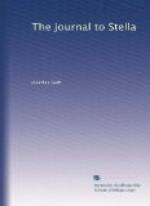22 See Letter 17, note 22.
23 See Spectator, No. 50, by Addison.
24 In all probability a mistake for “Wesley” (see Letter 1, note 12).
Letter 22.
1 Lord Paisley (see Letter 17, note 7).
2 See Letter 11, note 5.
3 Sir Hovenden Walker. The “man midwife” was Sir Chamberlen Walker, his younger brother. The “secret expedition” against Quebec conveyed upwards of 5000 soldiers, under the command of General John Hill (see Letter 10, note 2), but owing to the want of due preparations and the severe weather encountered, the fleet was compelled to return to England without accomplishing anything.
4 Robert Freind, elder brother of John Freind, M.D. (see Letter 9, note 1), became headmaster of Westminster School in 1711, and held the appointment until 1733. He was Rector of Witney, and afterwards Canon of Windsor, Prebendary of Westminster, and Canon of Christ Church. He died in 1751, aged eighty-four.
5 Christopher Musgrave was Clerk of the Ordnance.
6 Atterbury’s wife, Katherine Osborn, has been described as “the inspiration of his youth and the solace of his riper years.”
7 The original Chelsea Bun House, in Jew’s Row, was pulled down in 1839. Sir R. Philips, writing in 1817, said, “Those buns have afforded a competency, and even wealth, to four generations of the same family; and it is singular that their delicate flavour, lightness, and richness have never been successfully imitated.”
8 See Letter 8, note 22. King wrote to Swift (May 15, 1711), “The death of the Earl of Rochester is a great blow to all good men, and even his enemies cannot but do justice to his character. What influence it will have on public affairs God only knows.”
9 See Letter 11, note 11.
10 See Letter 17, note 6.
11 See Letter 18, note 4.
12 See Letter 20, note 13.
13 Swift’s curate at Laracor.
14 Queen Anne was the last sovereign who exercised the supposed royal gift of healing by touch. Dr. Johnson was touched by her, but without effect.
15 Richard Thornhill was tried at the Old Bailey on May 18, 1711, for the murder of Sir Cholmley Dering, M.P. for Kent, and found guilty of manslaughter only; but he was shortly afterwards assassinated (see Journal for Aug. 21, 1711; Spectator, No. 84). The quarrel began on April 27, when they fell to blows, and Thornhill being knocked down, had some teeth struck out by Sir C. Dering stamping on him. The spectators then interfered, and Dering expressed himself as ready to beg pardon; but Thornhill not thinking this was sufficient satisfaction, gave Dering the lie, and on May 9 sent him a challenge.
16 Tothill Fields, Westminster, was a favourite place for duels in the seventeenth century.
17 See Letter 13, note 17.
18 Benjamin Burton, a Dublin banker, and brother-in-law of Swift’s friend Stratford (see Letter 3, note 22). Swift says he hated this “rogue.”




